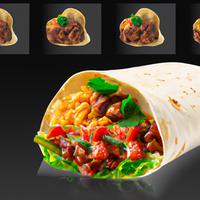
1 serving (50 grams) contains 150 calories, 4.0 grams of protein, 3.5 grams of fat, and 25.0 grams of carbohydrates.

Log this food in SnapCalorie

Nutrition Information
Calories |
710.9 | ||
|---|---|---|---|
% Daily Value* |
|||
| Total Fat | 16.6 g | 21% | |
| Saturated Fat | 4.7 g | 23% | |
| Polyunsaturated Fat | 0 g | ||
| Cholesterol | 0 mg | 0% | |
| Sodium | 1421.8 mg | 61% | |
| Total Carbohydrates | 118.5 g | 43% | |
| Dietary Fiber | 9.5 g | 33% | |
| Sugars | 4.7 g | ||
| protein | 19.0 g | 38% | |
| Vitamin D | 0 mcg | 0% | |
| Calcium | 189.6 mg | 14% | |
| Iron | 7.1 mg | 39% | |
| Potassium | 237.0 mg | 5% | |
* Percent Daily Values are based on a 2,000 calorie diet. Your daily values may be higher or lower depending on your calorie needs.
Food Attributes
Source of Calories
About Tortilla for burrito
A tortilla for a burrito is a soft, round flatbread traditionally made from flour, water, fat (such as vegetable oil or lard), and a pinch of salt. Originating from Mexican cuisine, it's a versatile staple used to wrap flavorful fillings, from beans and rice to meats, vegetables, and cheese. Typically larger than a regular tortilla, its pliability is perfect for folding and rolling burritos. While flour tortillas are a delicious and adaptable base, their nutritional aspects vary. They are a good source of quick carbohydrates and have a moderate protein content, but store-bought varieties may include added preservatives or higher sodium levels. Whole-grain or lower-fat versions can provide additional fiber and lower calorie content, making them a healthier choice. However, portions should be considered, as traditional tortillas can be calorie-dense depending on size and ingredients. Opting for smaller or homemade options can enhance their nutritional value.



